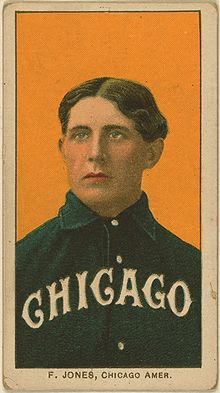For the first four games of the 1906 World Series, the White Sox
“Hitless Wonders” were true to form, with just 11 hits in 113 at-bats
for an average of .097—yet the upstarts had given the heavily favored
Cubs all they could handle. In the latter respect only, the remaining
games of the Series would be no different.
A throng of 23,257 filled every nook and cranny of the West Side Grounds for Game 5. Thousands more were outside, the Tribune
noted, “packed on adjoining roofs, clinging to telegraph poles and
wires like monkeys, or fretting behind locked gates and trying to gain
from the incessant yelling some idea of how the tide of battle was going
within.”
 |
| FIELDER JONES |
Ed Walsh was back on the mound for the Sox, just two days after his
complete-game shutout in Game 3, and Ed Reulbach went for the Cubs.
Both pitchers had trouble in the first inning. Reulbach was touched for a
run on three hits before he wriggled out of a bases-loaded jam. Walsh
allowed his first runs of the Series, through no fault of his own, when
errors by Frank Isbell and Jiggs Donahue led to three tallies by the
Cubs.
Cubs fans were ecstatic, figuring that the three runs would be
sufficient to subdue the Sox, who’d scored only six times in the first
four games. But suddenly the South Siders’ popgun attack erupted. When
Isbell and George Davis rapped back-to-back doubles to lead off the
third, Reulbach was through. The Sox weren’t. Jack Pfiester came on for
the Cubs and retired the side, but not before Isbell and Davis scored.
In the fourth, Pfiester got only one man out before he too was sent to
the showers. By the time Orval Overall finally got the third out, the
score was 7-3, and it was the Sox fans who had something to shout about.
The Cubs scored once in the fourth and twice in the sixth, again on
miscues by the Sox infielders (who committed an astounding six errors
among them). Doc White relieved a tiring Walsh in the seventh and
yielded just one scratch single over the final three innings to preserve
Big Ed’s second win of the Series. The final score was 8-6; it could
have been 8-0 if not for what the Tribune called “the rankest exhibition of fielding a team of champions ever gave in public.”
With the vaunted Cubs now at the brink of elimination, their ace
Mordecai “Three-Finger” Brown returned for Game 6 on two days’ rest. And
despite his own rather lengthy stint just the day before, White started
for the Sox. Like most managers in those days, neither Frank Chance of
the Cubs nor Fielder Jones of the Sox was shy about using his best
pitchers to, and often past, the point of exhaustion.
A crowd of 19,249 packed South Side Park to see whether the Sox
could pull off their miracle. The answer was not long in coming.
Trailing 1-0 in the bottom of the first, the Sox had two on and one out
when Davis banged a long fly to right. The Cubs’ Frank Schulte drifted
back, circled, and then stumbled as the ball fell safely behind him for a
double. The Cubs claimed that a policeman placed on the field for crowd
control had purposefully kicked Schulte in the pants as he reached for
the ball, but their pleas fell on deaf ears, and the game was tied.
Shortly thereafter, Donahue doubled to left, scoring two more runs. He
wouldn’t have batted if Davis’s ball had been caught. “Three runs scored
where there should have been none,” Charles Dryden wrote in the Tribune, “and more disaster followed.”
When Brown easily retired the first two Sox hitters in the second,
it seemed that he had settled down, as Dryden wrote, and “might yet
finish the game in his usual form.” But then he unraveled completely.
Eddie Hahn singled, Jones walked, and Isbell singled to load the bases.
Cubs shortstop Joe Tinker leaped and almost made a sensational catch of a
line drive by Davis, but the ball ticked off his glove as two runs
scored. George Rohe then singled, loading the bases again. With this,
Overall replaced Brown. He promptly yielded a single to Donahue and a
walk to Patsy Dougherty for two more runs before retiring Billy Sullivan, who had the dubious distinction of making two outs in the
inning.
The White Sox’ stunning two-out rally produced seven
successive base runners and four runs. It also put the game out of
reach. “Realizing only the most unexpected events could rob their heroes
of the hard fought for honors,” the Tribune reported, “the
thousands whose sympathies were with the Sox turned the affair into a
jubilee of noise. The waving banners, the tin horns, the dinner bells,
the megaphones, the counting of the score in unison—all were suggestive
of a gridiron contest. Nothing like it ever before was seen on a
baseball diamond.”
For the first time in the Series, the home team won. The final
score was 8-3. Against the Cubs pitching staff whose collective
earned-run average of 1.76 in the regular season remains the best of all time, the Hitless
Wonders had exploded for 16 runs on 26 hits in the two games that
decided the world championship. Their triumph still ranks among the
greatest upsets in World Series history.
Owner Charles Comiskey handed Jones a check for $15,000 and told
him to split it evenly among the White Sox; this was in addition to the
$25,052 they were to share from the gate receipts. Jones and the
players, naturally, regarded the extra $15,000 as a bonus from their
grateful boss. They didn’t learn until later, and much to their chagrin,
that it was really intended as an advance against their 1907 salaries.
Part 2 of 2.
No comments:
Post a Comment